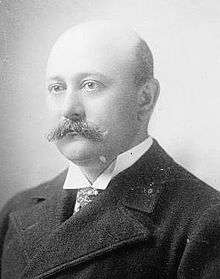Lucius Littauer
| Lucius Littauer | |
|---|---|
 Littauer, c. 1914 | |
| Member of the U.S. House of Representatives from New York's 22nd district | |
|
In office March 4, 1897 – March 3, 1903 | |
| Preceded by | Newton Martin Curtis |
| Succeeded by | William Henry Draper |
| Member of the U.S. House of Representatives from New York's 25th district | |
|
In office March 4, 1903 – March 3, 1907 | |
| Preceded by | James S. Sherman |
| Succeeded by | Cyrus Durey |
| Personal details | |
| Born |
January 20, 1859 Gloversville, New York |
| Died |
March 2, 1944 (aged 85) New Rochelle, New York |
| Nationality | American |
| Political party | Republican |
| Alma mater | Harvard University |
| Religion | Judaism |
Lucius Nathan Littauer (January 20, 1859 – March 2, 1944) was an American politician, businessman, and college football coach. He served in the United States House of Representatives from New York for five terms between 1897 and 1907. Littauer graduated from Harvard University in 1878 and was the school's first head football coach, guiding the Crimson to a record of 5–1–2 in 1881. In 1936 his donation of $2 million helped found Harvard's Graduate School of Public Administration, which later was renamed the John F. Kennedy School of Government.
Biography
Born in Gloversville, New York, Littauer moved with his parents to New York City in 1865. After attending the Charlier Institute for boys and young gentlemen in New York City, Littauer graduated from Harvard University in 1878, and later coached the Harvard Crimson football team in 1881.[1] Returning to Gloversville, Littauer entered his father's glovemaking business and went on to become an officer and director of many commercial and financial institutions.
Littauer was elected as a Republican to the Fifty-fifth and to the four succeeding Congresses (March 4, 1897 – March 3, 1907). He chose not to stand for reelection in 1906, returning instead to his glovemaking business. Littauer served as delegate to the Republican National Conventions in 1900, 1904, 1908, and 1928, and was Regent of the University of the State of New York from 1912 to 1914.
On February 4, 1914, Littauer and his brother William were convicted of smuggling and conspiracy to defraud after he admitted to importing valuable jewels from Venice worth in excess of $40,000 without paying the necessary duty. Federal District Court Judge Edwin S. Thomas sentenced Littauer to six months in jail, though the sentence was suspended. In his decision, Thomas stressed that Littauer's high standing served to aggravate the crime: "For an ex-congressman so far to forget his oath taken five times and knowing so well the provisions of the law he helped to frame seems to be incomprehensible."[2]
Littauer retired in 1927 and devoted his energies to education, medical research, and philanthropic work.
In 1936 Littauer donated $2 million to help found Harvard's Graduate School of Public Administration, which is known today as the John F. Kennedy School of Government at Harvard University. One of the buildings on Harvard Kennedy School's main campus is named in his honor.[3]
He also offered to build a hospital in memory of his father, Nathan Littauer. This act of generosity stirred the citizens of the community to contribute another $10,000, and on May 30, 1894, the original Nathan Littauer Hospital was opened.[4]
Littauer died at his country home near New Rochelle, New York, on March 2, 1944, and was interred in the Jewish Cemetery in New Rochelle.
Head coaching record
| Year | Team | Overall | Conference | Standing | Bowl/playoffs | ||||
|---|---|---|---|---|---|---|---|---|---|
| Harvard Crimson (Independent) (1881) | |||||||||
| 1881 | Harvard | 5–1–2 | |||||||
| Harvard: | 5–1–2 | ||||||||
| Total: | 5–1–2 | ||||||||
References
External links
- United States Congress. "Lucius Littauer (id: L000347)". Biographical Directory of the United States Congress.
- Lucius Littauer at the College Football Data Warehouse
- Lucius Littauer at Find a Grave
| United States House of Representatives | ||
|---|---|---|
| Preceded by N. Martin Curtis |
Member of the U.S. House of Representatives from New York's 22nd congressional district March 4, 1897 – March 3, 1903 |
Succeeded by William Henry Draper |
| Preceded by James S. Sherman |
Member of the U.S. House of Representatives from New York's 25th congressional district March 4, 1903 – March 3, 1907 |
Succeeded by Cyrus Durey |
![]() This article incorporates public domain material from the Biographical Directory of the United States Congress website http://bioguide.congress.gov.
This article incorporates public domain material from the Biographical Directory of the United States Congress website http://bioguide.congress.gov.